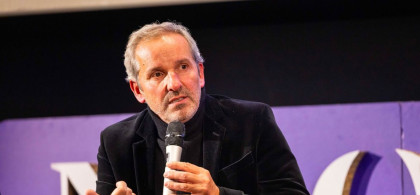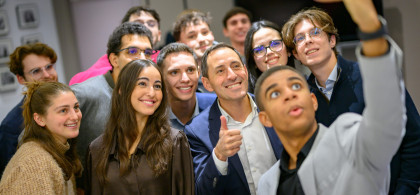
3 questions for Sébastien Missoffe, Managing Director of Google France
Published on 21/11/2025
In early November, NEOMA welcomed Sébastien Missoffe to its Rouen campus. He has been Vice President and Managing Director of Google France since 2017. Unsurprisingly, students turned out in large numbers to hear from the head of one of the world’s major tech companies and a leading figure in Big Tech. From this exchange, we have selected three questions and three key ideas.
Many young people see AI as a threat to jobs or creativity. How can this fear be turned into an opportunity?
I understand these concerns, but what I see above all is enormous potential. AI is first and foremost a gain in productivity, just as computers were in the 1980s. At the time, certain professions changed, but many reinvented themselves, and we are seeing the same evolution today. For me, for my children and for many students I meet, these tools are valuable aids in everyday life. They do not replace human roles; they transform them. It is therefore essential to take ownership of these technologies and understand how they work. Once you start using them, you realise they are not a threat but a lever. The jobs most affected will need support through the transition, but that is part of progress.
I would also add that there is a cultural dimension. France, with its long industrial history, sometimes fears losing what it has built. In California, by contrast, every innovation is seen as an opportunity: “I will launch a product, find a new use, move forward.” That is the mindset I would like to see encouraged here as well.
Among recent advances in artificial intelligence, which do you think is still underestimated today?
I talk less and less about artificial intelligence itself. It has now become part of our everyday tools, like the Internet. We no longer ask how it works; we simply use it.
Among the tools I use the most is NotebookLM, developed by Google. It allows you to import very long texts, generate summaries, create presentations or even podcasts. In practical terms, I can upload hundreds of PDF files or complex documents, and the tool produces, for example, an audio summary that I listen to the next day. It is an enormous time-saver.
How does Google ensure that tools such as Gemini or AI Overviews do not become amplifiers of misinformation?
This is a crucial question. At Google, we have been working for years on two major issues: avoiding information bubbles and ensuring the reliability of sources.
Here is a simple example. If you search for the date of Napoleon’s birth, the search engine will give you a single, verified answer. However, if you look up information about a political figure, such as Prime Minister Sébastien Lecornu, you will see a carousel of several sources: Ouest-France, Le Monde, Libération, L’Humanité, Valeurs actuelles and others. This diversity is deliberate. It allows users to form their own opinions based on varied sources.
As for Gemini, we are seeing that the questions users ask differ greatly from those typed into the traditional search engine. On Gemini, people ask fewer news-related questions and more about productivity, creativity or personal development. They ask things like: “How can I improve my CV?” or “How do I know if I’m in love?”
Whatever the tool, it is important to keep a critical mindset when assessing the reliability of information produced by AI.
FINAL THOUGHT
“We are living through an extraordinary period of change. Let’s stay curious, develop our technical skills, and nurture our empathy and understanding of the world. And above all, let’s be bold: change always brings new opportunities.”
3 KEY FIGURES
- 2030: Google aims for its data centres to run entirely on renewable energy
- €6 billion invested in green energy
- 70-20-10 structure: 70% core business, 20% innovation, 10% experimental projects, a balance that shapes Google's culture and values



